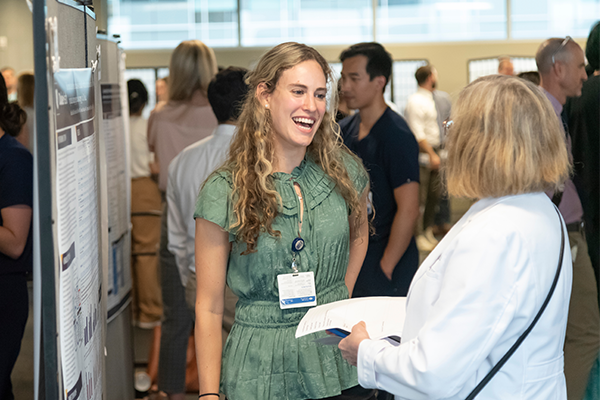
The Duke University School of Medicine Student Research Symposium has become a milestone and a launching pad for medical students to present their research discoveries.
The 54th annual event on Aug. 3-4 featured student presentations on a variety of topics, including the development of new antibiotics, use of big data to improve the diagnosis and treatment of diseases, LGBTQ+ perceptions of health care, and the impact of social determinants of health on health outcomes.
This year’s keynote speaker and Duke professor of medicine Kimberly S. Johnson, MD, urged students to bring passion and purpose to their research pursuits and challenged them to use research to advance equity in health care.
Students’ research was presented in platform and poster presentations. Each year, faculty and mentors are actively involved in judging, reviewing, and discussing research results.
The event showcases the unique curriculum at Duke that allows students to have an immersive dedicated research experience in their third year. It’s a period of at least 10 months but can be longer if students choose to do dual degrees or extended research experiences.
“The immersive academic experience is one of the things that makes Duke a special place to train future physicians,” said Daniel Laskowitz, MD, vice chair for academic affairs in the Duke Department of Neurology and director of the third-year research program. “It gives students the opportunity to learn from world-class researchers, to conduct their own research, and to make a real difference in the world.”
Students have a lot of flexibility in terms of what they can research, with options in basic science, clinical trials, big data, global health, epidemiology/population health, humanities, and more.
The experience also gives students the opportunity to get a fast-track to academic careers, as they learn basic grantsmanship, publish manuscripts and learn research tools.
Symposium Awards
Vice Dean’s Science Award/Best Basic Science: Chidyaonga Shalita, Identification of the Epileptic Engram in a Mouse Model of Temporal Lobe Epilepsy
Vice Dean’s Science Award/Best Clinical Research: Ronald Harris, Learning Health Applications: An Assessment of Area Deprivation Index, SDOH and COVID-19 Mortality in Duke Health ICUs
Palmer Awards
(GlaxoSmithKline James B.D. Palmer, MD, Memorial Scholarship for students engaged in research related to pulmonary disease)
Winners: Alexander Cherches, Sophie E. Nick, and Timothy N. Ochoa.